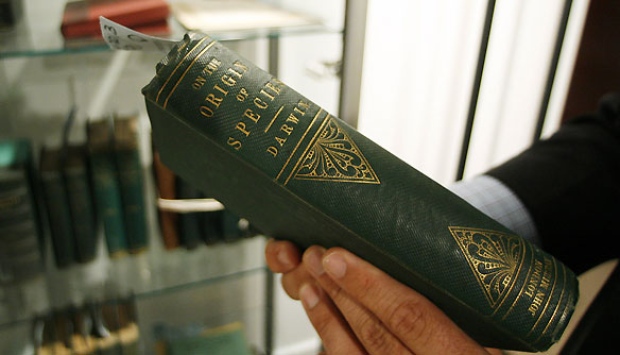Happy #DarwinDay: How to read the Bible and not worry about evolution
It's Darwin Day, when we honour the man and his theory of evolution. Not all of us, though, apparently. A survey released yesterday found that only 50 per cent of Brits are 'certain' of the truth of evolution, while 12 per cent believe in creationism – rather higher than the proportion who actually go to church.

The company responsible has declined to release the data tables, so a deeper dive into all this isn't possible. However, while not directly comparable, it chimes with Pew research showing a substantial number of Americans – 18 per cent – reject evolution entirely, believing humans have always existed in their present form. Only a third say that humans evolved due to processes like natural selection with no involvement by God or a higher power. Outside America, Pew says, there are other countries where even more people reject evolution: in several Latin American countries four-in-10 or more say humans and other living things have always existed in their present form.
For someone like me, who thinks the evidence for an ancient earth and the formation of different life-forms through a process of mutation and natural selection is irrefutable, this is rather depressing. And I suspect that Christians cling to creationism despite the evidence because they believe rejecting it means rejecting the Bible.
It doesn't. It means reading the Bible in the way it was meant to be read. So here's an example of how that works, from Genesis 1.
When God has created the world and furnished it with plants and animals, he makes people – 'in his own image', it says (verse 27).
What does this mean? Certainly not that we are like God in any physical sense. It's helpful to think about what we know about God so far: not much, other than that he is a creator. He brings order out of chaos. So at this point, we know that people are creators too. We are part of creation, but set aside from it; we can make things, and change the world.
So creativity, the ability to affect our environment, is built into us. This has all sorts of implications. It says something about our political systems: dictatorships which deny people freedom or justice are attacking the image of God. If you have no autonomy, you are less God-like. It says something about poverty: if people are so poor that they lose any sort of choice about how to live, the image of God is destroyed; if we have no way of affecting outcomes, we are not creators any longer. It says something about work: if people have to toil at a job they hate because they need the money, and can't go home at the end of the day satisfied that they have done something worthwhile, the image of God is denied. All of these things take away freedom and joy.
There is a deep desire in us for freedom. We are made in God's image, and denying freedom is denying our nature.
Churches are not very good at this. We tend to over-control what people think and do. But perhaps God worries less than church leaders and theologians.
So the idea that God creates human beings in his own image is a very rich one, especially in this Genesis context, and even more especially compared with the sort of ideas about God which were around at the time. In one version of the Babylonian creation myth of Marduk and Tiamat, Tiamat was the primordial chaos-monster who gave birth to sea-serpents and storm demons. Marduk kills her by smashing her skull and cuts her in half. From her ribs he makes heaven and earth, her weeping eyes become the sources of the Tigris and Euphrates, and her tail the Milky Way.
In Greek mythology, the Titan Cronos devoured his children, fearing that they would overpower him. The infant Zeus was spirited away and raised to adulthood, returning to vanquish his father.
In Norse mythology, Odin killed the giant Ymir and created the world from his dead body. His blood was the sea, his flesh the earth and his skull the sky.
So in many creation stories, the world is made in hatred, through violence. These things are built into the fabric of life, and into the earth itself: it is how the people who told these stories saw their own nature and the nature of the world.
In Genesis 1, people are made through God's word. No one dies, and we're told 'God blessed them'. The refrain throughout the chapter is 'God saw that it was good', and at the end of his creating it says, 'God saw that it was very good.'
Stories shape us. Stories about origins shape whole cultures.
Imagine the difference between a culture that believes, right down at its deepest roots, that human beings came into existence because of an act of murder, and a culture that believes human beings came into existence because of an act of love.
Genesis 1 isn't scientific truth. It's much truer than that: it's a passionate statement of God's intention for the world, his desire for human flourishing and his joy in creation. We ought to be free to read the Bible as it was meant to be read.
Happy Darwin Day.
Mark Woods is the author of Does the Bible really say that? Challenging our assumptions in the light of Scripture (Lion, £8.99). Follow him on Twitter: @RevMarkWoods











